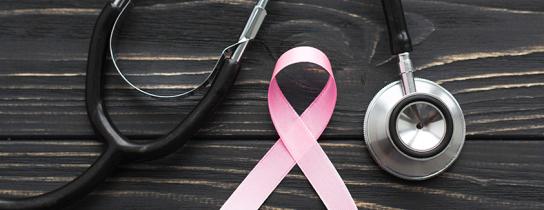
Breast Cancer Awareness: Prevention and early detection
One in eight women develops breast cancer in their lifetime. Understanding your risk factors can go a long way to help you make healthy decisions to keep your risk as low as possible.
When Should You Get Screened for Breast Cancer?
When breast cancer is found early there are many treatment options and an increased rate of successful treatment. This is why prevention and early detection are so important. Annual screening mammograms should begin at age 40. If you have dense breast tissue, you may benefit from screening with whole breast ultrasound (US) in addition to mammograms. If you have risk factors which increase your risk of breast cancer, talk to your healthcare provider about enhanced screening for breast cancer.
Those with a family history of breast cancer are at a higher risk for developing breast cancer. Screening mammograms should start 10 years earlier than the age of breast cancer diagnosis of a first degree relative (or at age 40). Individuals who have multiple family members with breast cancer are at an increased risk and could have a genetic mutation in the family which further increases the risk of breast cancer and other types of cancer. If your family history includes individuals with multiple breast and ovarian cancers, or multiple other types of cancer, ask your health care provider about genetic testing or consultation with a genetic counselor, to assess for mutations related to certain types of cancers. Your provider will help you construct a comprehensive three generation family history to help determine the need for genetic testing.
What Can I Do to Decrease My Risk?
A healthy lifestyle not only goes a long way in prevention of chronic conditions such as diabetes, heart disease and hypertension, but can also reduce the risk of developing breast cancer. Regular exercise has recently been linked to reduced risk while attaining and maintaining a healthy body mass index has been shown to reduce the risk of breast cancer, independent of regular exercise. Limiting alcohol intake reduces the risk of breast cancer. Healthy eating with a well balanced diet will help you maintain optimum health. A reduced risk of breast cancer is also associated with breast feeding and a first delivery before the age of 30. Hormone replacement therapy after menopause can increase the risk of breast cancer and its use should be discussed with careful consideration of the risks, including breast cancer risk assessment.
Are there Symptoms of Breast Cancer?
People with early stage beast cancer may not exhibit any symptoms at all so it is important to undergo annual clinical breast examinations and screening mammograms beginning at age 40 (or 10 years before a breast cancer diagnosis in a first degree relative). Signs of breast cancer can include a lump in the breast or arm pit (axillae), changes in the shape of the breast, dimpling or retraction in the skin of the breast and or nipple. If you feel or see any of these signs when doing a self-breast exam, you should seek advice from your health care provider right away. Remember, men can also develop breast cancer, so any of these symptoms should be taken seriously by men as well as women.
Early Detection is Key
The key to successful treatment of breast cancer is early detection. This has been made possible by widespread screening for breast cancer with mammography and clinical breast examinations. Individuals with breast cancer will have treatment tailored to them based on the biology of their breast cancer. Breast cancer treatment may consist of a combination of surgery, radiation, chemotherapy, anti HER2/neu targeted therapy, and/or anti hormonal therapy. Not all breast cancers require all of the parts of treatment, but each specific case is analyzed to determine the benefits of each part of therapy. Each treatment offered attempts to increase survival and decrease recurrence after breast cancer. You should speak to your health care provider with any concerns regarding your risk, symptoms, or treatment for breast cancer.
Dr. Veronica Ferencz, DO earned her Medical Degree from the Philadelphia College of Osteopathic Medicine in Philadelphia, PA and completed her Surgical Residency at St. John's Episcopal Hospital in Far Rockaway, NY. She completed her Fellowship in Breast Surgery at Mount Sinai West/Beth Israel/ St. Luke's in New York, NY. Dr. Ferencz is seeing patients at Crystal Run’s Monroe and Newburgh Locations.

 Optum Radiology at Crystal Run Healthcare
Optum Radiology at Crystal Run Healthcare Request medical records online
Request medical records online